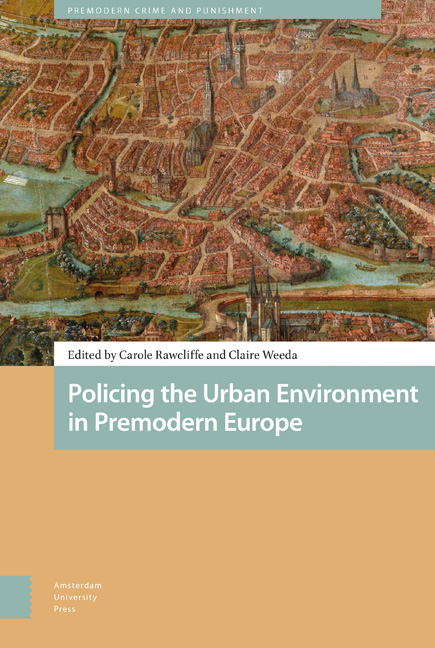Book contents
- Frontmatter
- Contents
- List of Illustrations
- List of Figures and Charts
- Introduction
- 1 Cleanliness, Civility, and the City in Medieval Ideals and Scripts
- 2 The View from the Streets: The Records of Hundred and Leet Courts as a Source for Sanitary Policing in Late Medieval English Towns
- 3 Urban Viarii and the Prosecution of Public Health Offenders in Late Medieval Italy
- 4 Food Offenders: Public Health and the Marketplace in the Late Medieval Low Countries
- 5 Policing the Environment of Late Medieval Dordrecht
- 6 Muddy Waters in Medieval Montpellier
- 7 Regulating Water Sources in the Towns and Cities of Late Medieval Normandy
- 8 Policing the Environment in Premodern Imperial Cities and Towns: A Preliminary Approach
- 9 Official Objectives of theVisitatio Leprosorum: Ambiguity, Ambivalence, and Variance
- Index
8 - Policing the Environment in Premodern Imperial Cities and Towns: A Preliminary Approach
Published online by Cambridge University Press: 21 November 2020
- Frontmatter
- Contents
- List of Illustrations
- List of Figures and Charts
- Introduction
- 1 Cleanliness, Civility, and the City in Medieval Ideals and Scripts
- 2 The View from the Streets: The Records of Hundred and Leet Courts as a Source for Sanitary Policing in Late Medieval English Towns
- 3 Urban Viarii and the Prosecution of Public Health Offenders in Late Medieval Italy
- 4 Food Offenders: Public Health and the Marketplace in the Late Medieval Low Countries
- 5 Policing the Environment of Late Medieval Dordrecht
- 6 Muddy Waters in Medieval Montpellier
- 7 Regulating Water Sources in the Towns and Cities of Late Medieval Normandy
- 8 Policing the Environment in Premodern Imperial Cities and Towns: A Preliminary Approach
- 9 Official Objectives of theVisitatio Leprosorum: Ambiguity, Ambivalence, and Variance
- Index
Summary
Abstract
Recent historiographical studies of the Holy Roman Empire reveal that policy focused on defining and redefining the relationship between governors and citizens, largely through negotiating practices. Historians have applied these discoveries in limited ways when discussing public health policies in German-speaking areas, ignoring questions of compliance, resistance, or enforcement. Some lacunae result from archival losses, but survivals enable us to fill many gaps. In this chapter, relevant premodern statutes are first identified. Secondly, textual analysis of manifold sources uncovers implicit associations (for example, parallels between dirt and prostitution), while highlighting explicit relationships between communal health and such general issues as religion, morality, and the common good. Negotiation practices are unveiled, for instance, in modifications to statutes and regulations. Thirdly, contemporary chronicles, diaries, accounts, council minutes and administrative documents are examined for information about the implementation of laws and ordinances.
Key words: Holy Roman Empire; public health; common welfare; political practice; negotiations
In recent years, historiographical studies of the Holy Roman Empire have shown how early modern policies focused on defining and redefining the relationship between governors and citizens, and that they were – for a large part – shaped by negotiating practices. Historians have discussed such practices in the general context of politics and communication, as well as from more specialized perspectives, such as early modern criminal prosecution, and the politics of migration or religion. However, they have mostly neglected the field of premodern environmental politics. The same applies to another emerging, crucial approach to analyses of premodern urban societies that examines ritual, communal, and symbolic activities.
In contrast, although the history of the environment has been an established discipline in Germany for decades, guiding questions have concerned either the impact of the environment on human society or, vice versa, environmental change caused by economic activity or by the behaviour of the urban population. Moreover, research was often inspired by contemporary environmental problems and centred on the period from the middle of the eighteenth century onward, whereas the medieval and early modern periods were often glossed over or superficially regarded as a ‘dark’ precursor to subsequent developments. More nuanced interpretations have only recently been included in the general historiography of premodern society, despite Ulf Dirlmeier's work in the 1980s on the environment-related politics of government in medieval towns and cities.
- Type
- Chapter
- Information
- Policing the Urban Environment in Premodern Europe , pp. 231 - 270Publisher: Amsterdam University PressPrint publication year: 2019



